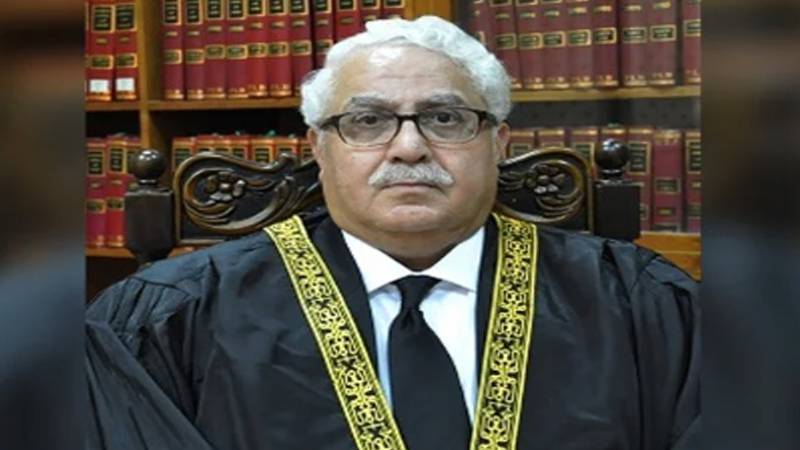
The Supreme Judicial Council (SJC), the apex body for the accountability of judges of the superior courts, on Friday, issued a show cause notice to Supreme Court's Justice Sayyed Mazahar Ali Akbar Naqvi in the leaked audio case. The SJC gave Justice Naqvi until November 10 to submit a written response.
The SJC convened in Islamabad on Friday with Chief Justice of Pakistan Qazi Faez Isa in the chair. Other members of the SJC who attended the hearing included Senior Pusine Judge Sardar Tariq Masood, Justice Ijazul Ahsan, Lahore High Court Chief Justice Ameer Bhatti and Balochistan High Court Chief Justice Naeem Afghan. The Supreme Court's Registrar and Attorney General of Pakistan were also present.
In the meeting, which lasted for two hours, the council reviewed a total of 29 complaints. Of these, 19 were dismissed. It was decided to inform the Judges who were complained against, and the legal heirs of those who had passed.
The council noted that some complaints were frivolous and it was decided to caution the lawyers who had filed them.
Moreover, the council reviewed ten complaints pending against Justice Naqvi.
Some of the complaints pending against him accuse him of corrupt practices, accumulating assets beyond known sources of income, violating the code of conduct, and his alleged involvement in the alleged leaked audios.
Advocate Mian Dawood had filed a reference in the SJC against Justice Naqvi for alleged corrupt practices. He had attached documents claiming that Justice Naqvi and his sons had purchased property under suspicious circumstances.
The Pakistan Muslim League-Nawaz (PML-N) lawyer's forum had filed a reference against Justice Naqvi for violating the code of conduct, the Constitution and the law for refusing the bail application of a petitioner. The bail was approved once the petitioner changed their lawyer. Later, when the matter was taken up in the Supreme Court, the apex court gave an observation against such practices.
"It is a matter of record that Justice Naqvi has misused his authority as a judge of the apex court in the most obvious of manners. Such repetitive conduct on his part has not only proved detrimental to the securing of the ends of justice but has also greatly undermined and brought into disrepute the image of our apex court in public estimation," the reference filed in March alleged.
A third reference filed against him was over his alleged audio leak with former Punjab chief minister Parvez Elahi, where they allegedly discussed the outcome of a case.
The Pakistan Bar Council had also filed a reference over Justice Naqvi's audio leaks and his financial practices.
Through a majority decision of three judges to two, the SJC decided to issue a show cause to Justice Naqvi, directing him to submit a written reply by November 10. The two council members who were in minority stated that they needed more time to consider the complaints against him.
At the next hearing of the SJC, the Attorney General shall act as the prosecutor. Justice Naqvi will have the option to appeal against the reference in open court.
In the event he resigns as a judge, he will still be entitled to his pension and other post-retirement perks.
A reference of misconduct against former Supreme Court judge and former National Accountability Bureau (NAB) chairman Justice (retired) Javed Iqbal was also taken up. However, the reference was disposed of after terming it non-maintainable.
In a press release of Friday's meeting issued later in the day said that a complaint was also filed against Justice Ijazul Ahsan. Subsequently, the council was reconstituted by requesting Justice Syed Mansoor Ali Shah, the next Judge in seniority in the Supreme Court, to take his seat on the Council on the recusal of Justice Ahsan.
The complaint was later dismissed.
A complaint was filed by Amna Malik against Justice Sardar Tariq Masood. Since she had made the complaint public, the council was urged to take it up and determine its veracity.
Subsequently, the council was reconstituted by requesting Justice Shah, the next judge in seniority in the Supreme Court, to take Justice Masood's seat on the Council following his recusal.
The council considered the complaint but found that requisite material was not attached with it, therefore, the council directed Malik to produce the evidence supporting her complaint. Upon its receipt, the secretary was directed to provide it to Justice Sardar Tariq Masood, so that he may respond to it.
The council also summoned Malik at the next meeting of the council, when Justice Masood can present his point of view.
Since the council is a separate constitutional body, it was deliberated whether it would be appropriate to constitute a separate secretariat for it, with a full-time secretary and requisite staff.
It was decided that the Registrar of the Supreme Court, who acts as the secretary of the council, can submit a working paper in this regard to the chief justice - who is the chairman of the SJC - to amend or substitute it, which will then be circulated for consideration of the other members.

